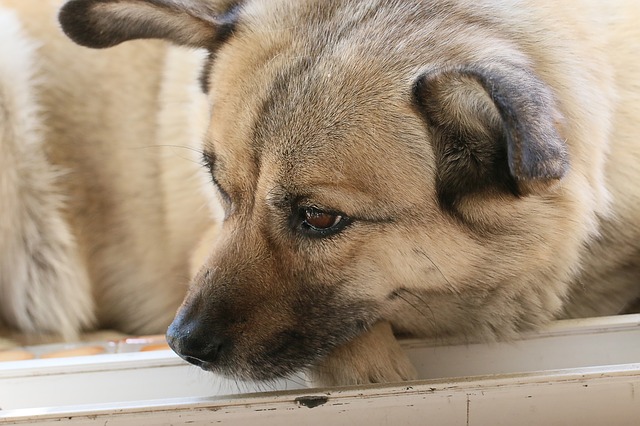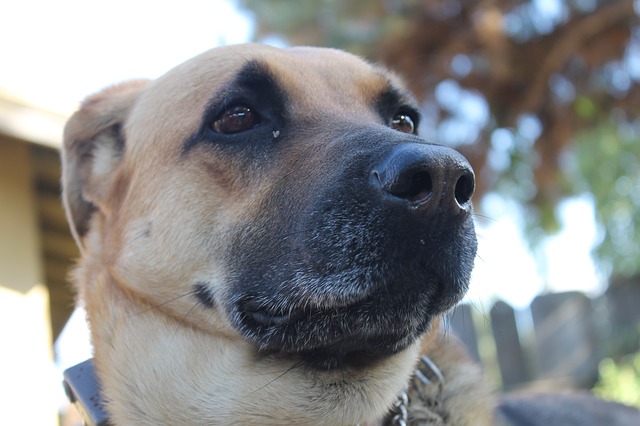
You’ve probably felt some negative physical effects from stress or anxiety in your life. You start to have stomach problems or headaches; maybe you start chewing on your nails or pulling out your hair. Could your dog’s anxiety be causing some of his chronic health problems the same way stress and anxiety cause you to suffer from health problems? Dogs aren’t all that different from humans in the way that they process stress and anxiety. Some of the symptoms they have mimic human symptoms, and some are slightly different, but several different health problems can be tied to stress or anxiety in our pooches. Here are some symptoms of anxiety in canines, how they can affect your dog’s health, and what you can do to help reduce your fur child’s anxiety to help him lead a healthier, happier, and longer life.

Symptoms of anxiety:
-Aggression, growling, or snapping
-Behavioral issues
–Depression, lack of energy, or lack of appetite
-Destroying objects, especially near windows and doors
-Diarrhea, constipation, or vomiting
-Dilated pupils
-Drooling or panting
-Eating nonfood objects (pica)
-Excessive barking, especially when left home alone
-Hiding
–Lick granulomas caused by excessive licking, usually on the legs or feet
-Pacing or restlessness
-Repetitive, compulsive behaviors such as licking, chewing, or pulling hair out
-Skin problems
-Trembling, whimpering, or whining
-Urinating or defecating in the house, especially when left home alone
-Yawning

How anxiety can affect your dog’s health
As you can see, anxiety can affect your dog in lots of different ways, and many of those ways can affect your dog’s health, both in the short term and in the long term. Some of these symptoms are outright problems, such as diarrhea, hair pulling leading to bald spots, and lick granulomas. Other symptoms, such as pica and destructiveness, can lead indirectly to health problems such as swallowing an object that becomes lodged in your dog’s digestive tract or winds up poisoning them. On top of all of these immediate problems, anxiety can affect your dog’s immune system, leading to a whole host of other problems. According to Your Old Dog:
“As the stress increases, the immune system becomes overtaxed and the potential for bigger health problems start to mount. The adrenal glands are the body’s natural stress organs and chronic stress places a huge burden on how well they function. The glands wear out, reducing the dog’s ability to deal with any additional or new stress. Plus, impaired adrenal glands can also hurt the dog’s immune system.”
As you can imagine, an impaired immune system can leave your dog susceptible to many different illnesses that may impact your dog’s health long-term. So what can you do to help?

Ways to reduce your dog’s anxiety or stress
In order to truly help relieve your dog’s anxiety, you need to understand what’s causing it. Is it separation anxiety? Loud noises such as thunderstorms or fireworks? Past traumatic experiences? Lack of proper nutrition or exercise? Too much stress inside the home caused by other family members (human, furry, or otherwise)? Once you understand the cause of your dog’s anxiety, you can try to start reducing it. According to Wag Walking, these are the most common types and causes of anxiety in dogs:
Types
-Separation anxiety – occurs when the owner leaves or whenever the dog is left alone
-Noise anxiety – loud noises such as thunder, fireworks, or noisy trucks
–Travel anxiety – becomes anxious riding in the car
-Confinement anxiety – reacts negatively to confined spaces
-Phobia – unexplained anxiety reaction in relation to various triggers

Causes of Extreme Fear and Anxiety in Dogs
Many factors can be related to excessive fear and anxiety in dogs. These are some of the most common.
-Poor socialization in early life
-Predisposition due to breed or temperament
-A stressful or traumatic event
-A medical condition or illness
-Age-related degeneration in the brain
Each type and cause of anxiety will require a different treatment, and you may want to consult with a professional dog trainer or your vet for a personalized plan. With that being said, here are some general tips that may help reduce your dog’s anxiety.

Counterconditioning
Counterconditioning changes your dog’s response to what’s causing the anxiety. For example, a dog that has a fear of strangers entering the home may be taught to sit at the sound of the doorbell instead of barking or hiding.
Desensitization
This is a method of slowly reintroducing your dog to the cause of his anxiety a little bit at a time. For example, dogs that are afraid of car rides may be taken for just a short ride around the block with a rewarding treat or walk afterward. Slowly increase the length of the drive and always reward your dog after, and hopefully, your dog will lose his fear of car rides.

Play soothing music
“Through a Dog’s Ear” is a highly recommended album (it has a 4.5-star rating on Amazon with 472 customer reviews) of music specifically designed to help dogs relax. Classical music has also been shown to help dogs (and people) relax.
ThunderShirt
The ThunderShirt is a tight garment that feels like a relaxing hug to your anxious dog. They claim to help 80% of dogs reduce their anxiety, and their 4-star rating seems to back up this statistic.

Supplements
There are a variety of supplements on the market (including Project Paws® Advanced All-Natural Calming Chews for Dogs, every purchase of which feeds 7 shelter dogs) designed to help dogs relax. This can be a great step to try before resorting to more heavy-duty medications prescribed by a veterinarian.
Medication
When all else fails, there are several medications that may be prescribed to help reduce your dog’s anxiety. The idea of putting your dog on medication may be unappealing, but you need to consider your dog’s overall quality of life. If his life is seriously impacted by his anxiety, medication may be the best way to help him be healthier and happier. There are a variety of different medications with different indications and possible side effects, so you’ll want to have a detailed conversation with your vet about which medication might be best for your dog.
(H/T: AKC, Health, PetMD, Wag Walking, Your Old Dog)
via Whisker Therapy